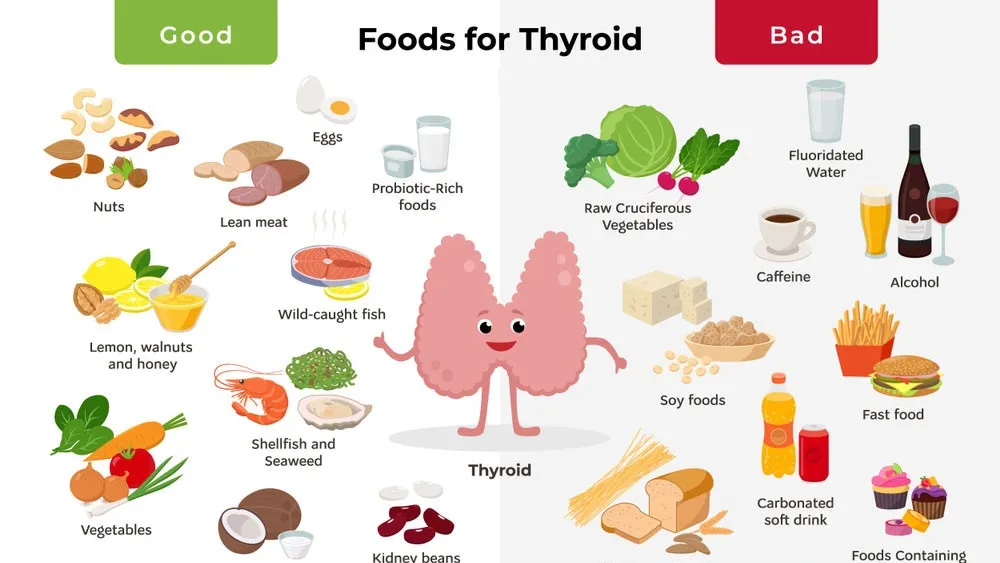
Introduction
Living with thyroid issues can be challenging, but understanding the role of diet in managing symptoms can make a significant difference. In this article, we’ll explore the connection between diet and thyroid health, uncovering actionable steps to alleviate fatigue, constipation, and slow metabolism.
Understanding Thyroid Issues
Thyroid issues, such as hypothyroidism and Hashimoto’s disease, occur when the thyroid gland doesn’t produce enough hormones, leading to various symptoms like fatigue, weight gain, and constipation. These conditions can significantly impact overall well-being and quality of life.
Impact of Diet on Thyroid Health
Diet plays a crucial role in supporting thyroid function and managing associated symptoms. By making strategic dietary choices, individuals can optimize thyroid health and alleviate common complaints.
Nutrients Essential for Thyroid Health
Certain nutrients are vital for thyroid function, including iodine, selenium, zinc, and vitamin D. Ensuring adequate intake of these nutrients through diet is essential for supporting optimal thyroid function.
Foods to Include in Thyroid Diet
Incorporating thyroid-friendly foods into your diet can help provide the necessary nutrients for optimal thyroid health. Examples include seafood, nuts, seeds, leafy greens, and dairy products.
Foods to Avoid for Thyroid Health
Some foods can negatively impact thyroid function and exacerbate symptoms. These include processed foods, refined sugars, and excess caffeine. Limiting or avoiding these foods may help improve thyroid health.
The Role of Exercise in Thyroid Health
Regular exercise is crucial for managing thyroid issues. Physical activity helps boost metabolism, improve mood, and enhance overall well-being. Aim for a combination of cardio, strength training, and flexibility exercises for optimal results.
Hydration and Thyroid Function
Staying hydrated is essential for supporting thyroid function and overall health. Drink plenty of water throughout the day to maintain hydration levels and promote optimal thyroid function.
Stress Management Techniques
Chronic stress can negatively impact thyroid function and exacerbate symptoms. Incorporating stress management techniques such as meditation, yoga, and deep breathing exercises can help reduce stress levels and support thyroid health.
Sleep Quality and Thyroid Health
Quality sleep is crucial for thyroid health and overall well-being. Aim for 7-9 hours of uninterrupted sleep each night to support optimal thyroid function and improve symptoms like fatigue and sluggish metabolism.
FAQs about Thyroid Health and Diet
Can diet alone cure thyroid issues?
While diet plays a significant role in managing symptoms, it’s not a cure for thyroid conditions. It’s essential to work with a healthcare professional to develop a comprehensive treatment plan.
Are there specific foods that can boost thyroid function?
Certain foods, such as seaweed, Brazil nuts, and fatty fish, are rich in nutrients that support thyroid health. However, moderation is key, and it’s essential to maintain a balanced diet.
Can gluten-free diet help with thyroid issues?
Some individuals with thyroid issues may benefit from a gluten-free diet, especially those with Hashimoto’s disease. However, more research is needed to understand the relationship between gluten and thyroid health fully.
Is it safe to take supplements for thyroid support?
Supplements can be beneficial for individuals with thyroid issues, but it’s crucial to consult with a healthcare professional before starting any new supplement regimen to ensure safety and effectiveness.
How long does it take to see improvements in symptoms with dietary changes?
The timeline for seeing improvements in symptoms varies from person to person and depends on factors such as diet, lifestyle, and the severity of thyroid issues. Consistency and patience are key when making dietary changes.
Can stress worsen thyroid symptoms?
Yes, chronic stress can negatively impact thyroid function and exacerbate symptoms like fatigue and weight gain. Incorporating stress management techniques into your daily routine is essential for supporting thyroid health.
Conclusion
In conclusion, adopting a thyroid-friendly diet can play a significant role in managing symptoms of fatigue, constipation, and slow metabolism associated with thyroid issues. By prioritizing nutrient-rich foods, staying hydrated, managing stress, and getting adequate sleep and exercise, individuals can support optimal thyroid function and improve overall well-being.
Credits and Sources
This article was written based on expert knowledge and credible sources, including:
– American Thyroid Association: [www.thyroid.org]
– Mayo Clinic: [www.mayoclinic.org]
– National Institute of Diabetes and Digestive and Kidney Diseases: [www.niddk.nih.gov]





